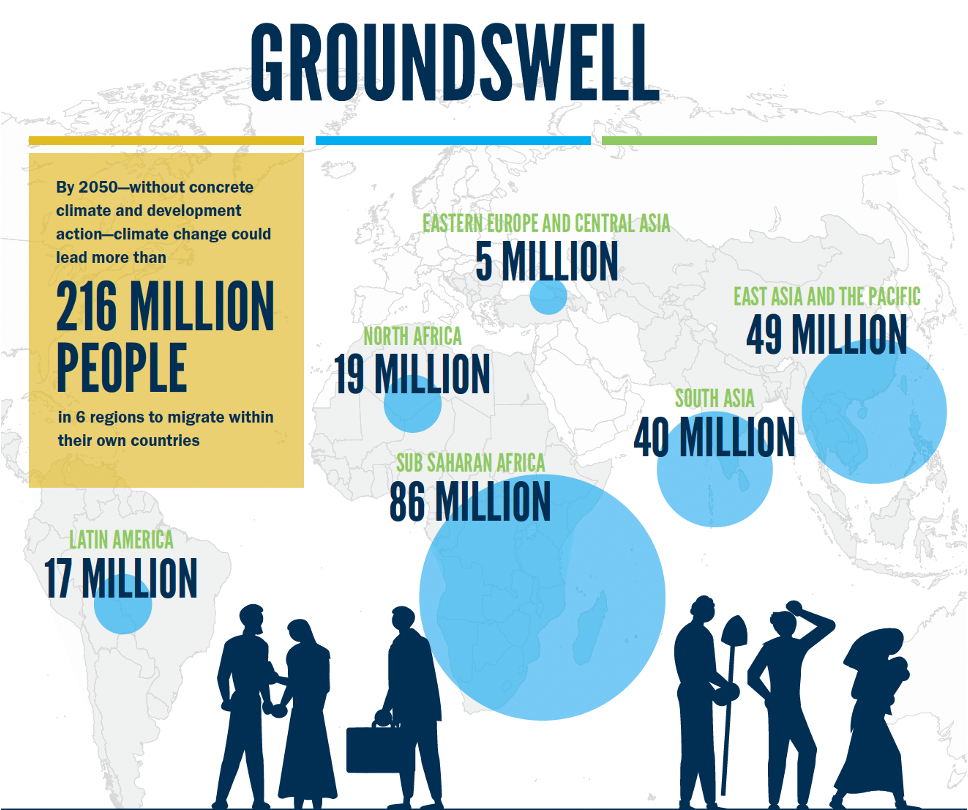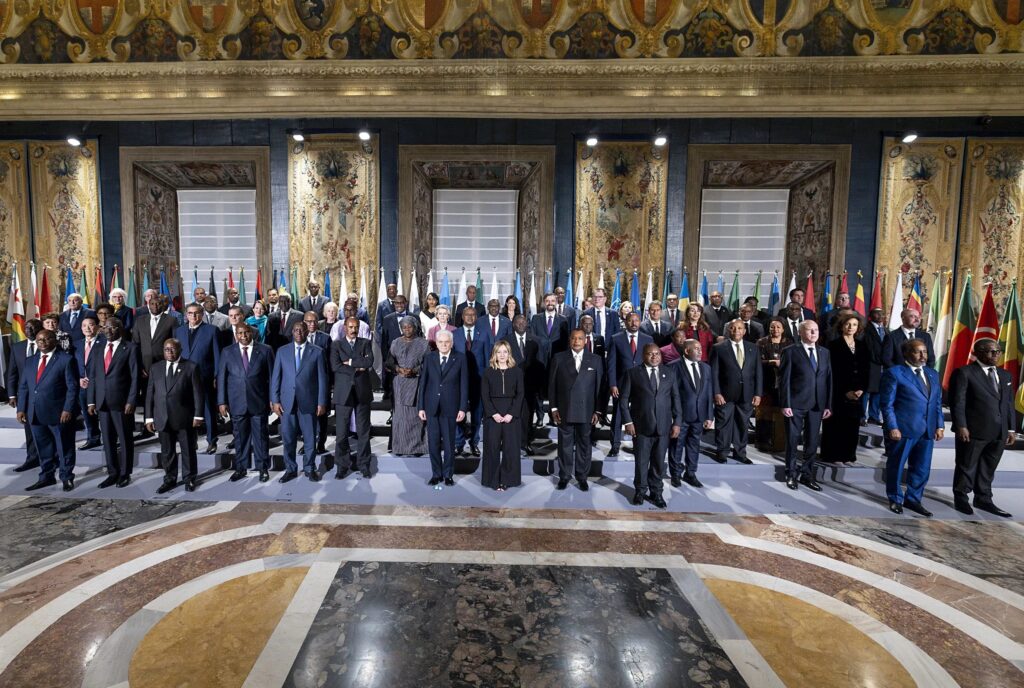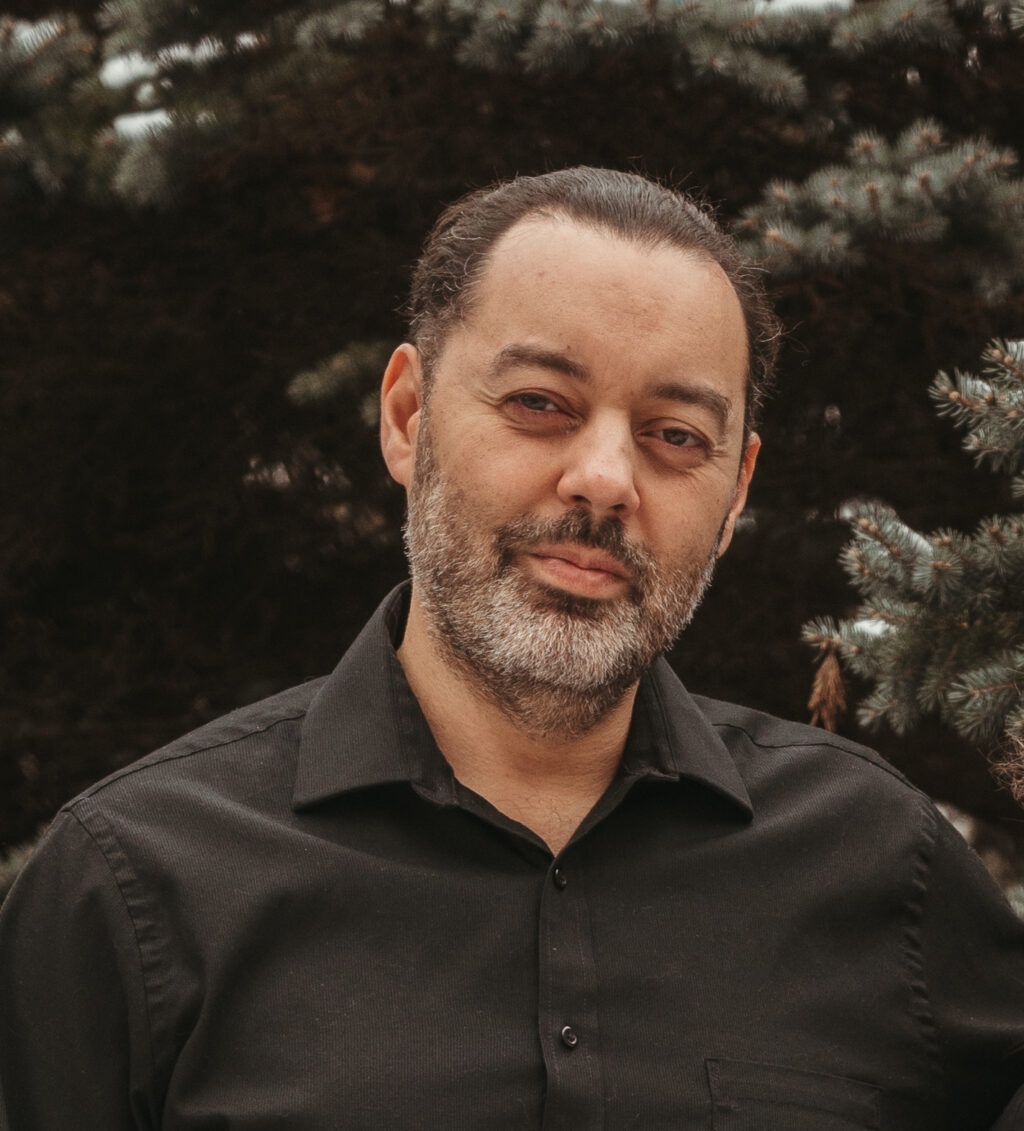Greetings from Nairobi. I am troubled by the number of African presidents, prime ministers, and senior officials who skipped the G77+China South Summit in Kampala last week, but flocked to Rome this week when they were summoned by the Italian prime minister Giorgia Meloni to attend the Italy-Africa Summit to be presented with the Mattei Plan for Africa.
Since African leaders don’t have a plan for Africa, we will continue to be part of someone else’s plans, be it Europe, the US, China, or the G7 (which Italy is presiding this year).
It is 2024, so colonial plans come dressed up in PR-proof rhetoric with partnership slogans like “not predatory, not paternalistic, but not charitable either.” This is how Meloni described Italy’s “vision of development in Africa.”
Climate Refugees are on the Move
Italy has a problem. It is the gateway to Europe for thousands of migrants who cross the Mediterranean every year. Hundreds of them perish before they make it to European shores. According to UNHCR, “between January and July 2023, some 120,200 refugees and migrants arrived in Europe, specifically through the Mediterranean and Northwest African maritime routes.
This resulted in a 77 per cent increase compared to the same period last year. In July, overall arrivals increased by […] 70 per cent compared to the same period last year.” According to the Missing Migrants Project database, the number of migrant deaths and disappearances in the Mediterranean increased from 2,048 in 2021 to 2,411 in 2022 and to 3,041 by the end of 2023 (UN News).
Note that the UN is very deliberate about not using the label “Climate Refugees” because it carries with it very important legal protections and financial implications that the system is not ready to handle yet.

A recent report “Groundswell” by the World Bank, which is not the most radical climate organization, estimates that by 2050 (aka the day after tomorrow on the climate calendar), about 216 million people will be internally displaced by climate events globally, about half will be displaced in Africa, and even if a small fraction of those individuals decide to cross the Mediterranean, we will have a refugee crisis on a scale never seen before.
Needless to say, that when people are displaced internally, this tends to put immense pressure on local resources in terms of food, housing, healthcare, education, and jobs, all of which exacerbates social tensions and often sparks conflicts. In short, Italy’s (and the EU’s) problems are about to get a lot bigger than what they are today. I discussed this on a BBC radio interview this week (click on the audio file below and give it a listen)
Some of the most important push factors for this phenomenon is climate change, but when it’s coupled with restricted fiscal policy space due to Africa’s massive external debt, which international financial institutions tell us requires austerity measures, then we have added fuel to the fire of migration.
The EU policy has been focused on policing the boarder and intensifying the security apparatus with cooperation from North African governments.
The migration phobia is based on concerns that immigrants and refugees are an economic burden, that they will take jobs away from European workers, and there is of course the racist argument about changing the ethnic, religious, and cultural composition of Western Europe.
My colleague Peo Hansen wrote an excellent book debunking the myth about the negative economic pressures that Europe faces due to migration.
The book is called Modern Migration Theory: An Alternative Economic Approach to Failed EU Policy (Columbia University Press, 2021), and I had the pleasure of writing a review essay called “Preparing for a Climate Refugee Tsunami: The Case for Climate Reparations,” You can read the entire symposium published by Discover Society here.
The Mattei Plan for Africa
Named after Enrico Mattei, the founder of Italy’s national oil company ENI, the Mattei Plan by its very name doesn’t sit well with anyone in Africa.
Mattei was known in Italy for using bribery to get things done, and ENI is not exactly the most climate friendly corporation that we want at the center of this partnership initiative. Needless to say that having the current CEO of ENI (along with other Italian CEOs) sitting in the same room with African leaders summoned to Rome to be told about Italy’s vision for Africa is just not what we want to see in 2024.
To his credit, African Union Commission Chairman Moussa Faki Mahamat made it very clear that African leaders went to Rome without knowing what the Mattei plan actually is. He said “we would have liked to have been consulted.”
He later added “we need to pass from words to deeds [….]. You can understand that we cannot be happy with promises that often are not maintained.” You can read his full speech here.
I have also unpacked a bit of the Mattei plan on CGTN Africa this week. Click on the video below and give it a listen. I briefly explained that the Mattei plan was recently tested with Tunisia and now it’s being scaled up to the entire continent.
While we do not know the full details of the Mattei plan for Africa yet, we have bits and pieces of what was revealed over the last few days. The infographic below gives a brief overview of some of the main points. Special thanks to my friends at Don’t Gas Africa for doing the investigative work and for producing this infographic.
Apparently the Mattei plan is a 4-year plan that would be renewed or scaled up in the future depending on how things go. The total funds amount to about 5 billion euros. I am guessing the majority of which will be loans and loan guarantees, with a bit of grants here and there (let’s remember to put this in the context of overall climate finance needs).
The bulk of the investments will be in the energy sector. Meloni made it very clear that Italy wants to become the energy hub for the EU. Plans are already underway to build the ELMED Interconnector Project, which will be the first direct current connection between Europe and Africa (more details are available here on the ELMED Project website).
Italy’s Climate Fund has pledged 3 billion euros, while the African Development Bank has pledged 2.5 billion euros. It’s noteworthy that Saudi Arabia has pledged 200 million euros and the UAE 100 million euros. It appears that OPEC countries have been identifying ways to solidify demand for their fossil fuel products in Africa now that global demand is set to decline.

African CSOs Dissect the Mattei Plan
Led by Don’t Gas Africa, more than 80 African civil society organizations issued a joint letter addressed to the Italian government ahead of the Italy-Africa Summit.
African civil society and independent expert voices have made it very clear that we cannot accept partnership offers that deepen Africa’s structural problems, increase our dependence on extractive industries, and lock us further into the obsolete, expensive, unhealthy, and unjust fossil fuel energy system of the past.
We want to build renewable energy infrastructure to serve the 600 million Africans who have no access to electricity rather than export it for Europe’s energy security. We want to invest in food sovereignty and agroecology, not cash crop exports to complement the EU Common Agricultural Policy (CAP).
We need to escape the bottom of the global value chain and invest in high value-added manufacturing that prioritizes clean energy, clean cooking, and clean transportation manufacturing for deployment in Africa. If the Italy-Africa partnership does not respect Africa’s needs, then I am afraid the so-called “Mattei Plan” is nothing but a blatant colonial project that must be exposed and rejected rather than celebrated by African leaders.
Africa’s Plan for Africa: Agenda 2063
The African Union has an important strategic plan for Africa, and it’s called Agenda 2063: The Africa We Want. Does the Mattei Plan acknowledge Africa’s Agenda 2063? Does Italy want to contribute to implementing Africa’s priorities? Does anybody in the Global North want Agenda 2063 to see the light of day and turn Africa into a global economic powerhouse? The answer to all of these questions is clearly niente, non, nein, no! Why? Because they want Africa to continue playing the same colonial role that was imposed on us as the place for cheap raw materials, the large consumer market for European industrial output, and the damping ground for obsolete technologies and assembly line manufacturing that is no longer needed in Europe.
Most African leaders want to activate Agenda 2063, but their fiscal capacity has been decimated by the burden of external debt, which is used as a pressure point to delay and prevent the structural decolonization of our economies.
As we discussed in our recent report Just Transition: A Climate, Energy, and Development Vision for Africa (May 2023, published by the Independent Expert Group on Just Transition & Development), Africa’s external debt stems from three key areas of economic deficiencies: food, energy and manufacturing deficits.
The IMF and the World bank have systematically contributed to deepening these structural traps by financing and mandating policies that (1) prioritize investments in cash crops for export rather than core crop production to restore our food sovereignty; (2) neglect the deployment of renewables that reduce our dependence on fossil fuel imports; and (3) deepen our position at the bottom of the global value-chain by forcing us to specialize in low value-added manufacturing. This is what called intentional entrapment (Also available in Arabic, courtesy of Inhiyez).
I hope when African leaders gather in Addis Ababa in two weeks at the African Union Summit that they will have a serious conversation about activating and operationalizing Agenda 2063 in a concrete way that allows us to establish strategic partnerships on terms that are favorable to Africa’s interests.
And I long for the day when Global North leaders are summoned to the African Union headquarters to listen to African leaders as they reveal their vision to reposition Africa in the global economy as an economic powerhouse to be reckoned with.
This repositioning of Africa is the prerequisite for rebalancing the world economically, ecologically, and geopolitically. And in the iconic words of Emperor Haile Selassie, “the dream of lasting peace… will remain but a fleeting illusion to be pursued, but never attained” (1963 UN General Assembly speech by Haile Selassie, made famous by Bob Marley in his classic song War). Yes, you’ve guessed it, I am a huge Bob Marley fan, but who isn’t really?
Fadhel Kaboub is an associate professor of economics at Denison University (on leave), and the president of the Global Institute for Sustainable Prosperity. He is also a member of the Independent Expert Group on Just Transition and Development, and serves as senior advisor with Power Shift Africa. He has recently served as Under-Secretary-General for Financing for Development at the Organisation of Southern Cooperation in Addis Ababa, Ethiopia. Dr. Kaboub is an expert on designing public policies to enhance monetary and economic sovereignty in the Global South, build resilience, and promote equitable and sustainable prosperity. His recent work focuses on Just Transition, Climate Finance, and transforming the global trade, finance, and investment architecture. His most recent co-authored publication is Just Transition: A Climate, Energy, and Development Vision for Africa (May 2023, published by the Independent Expert Group on Just Transition & Development). He has held a number of research affiliations with the Levy Economics Institute (NY), the John F. Kennedy School of Government at Harvard University (MA), the Economic Research Forum (Cairo), Power Shift Africa (Nairobi), and the Center for Strategic Studies on the Maghreb (Tunis). He is currently based in Nairobi, Kenya and is working on climate finance and development policies in Africa. You can follow him on Twitter @FadhelKaboub and you can read his Global South Perspectives on substack where he blogs regularly.



Your point of view caught my eye and was very interesting. Thanks. I have a question for you.